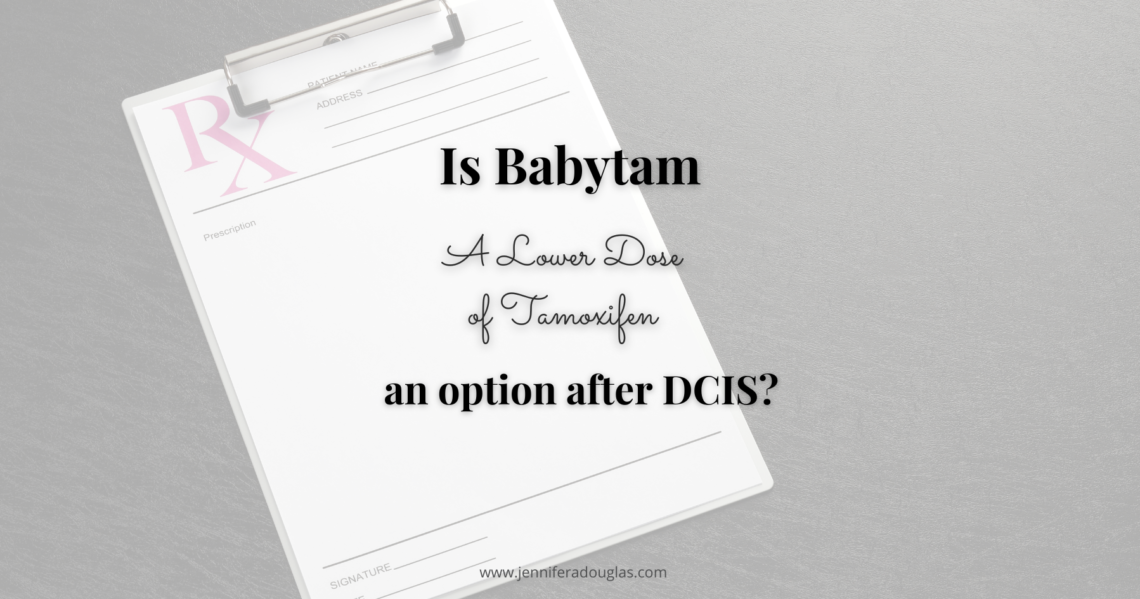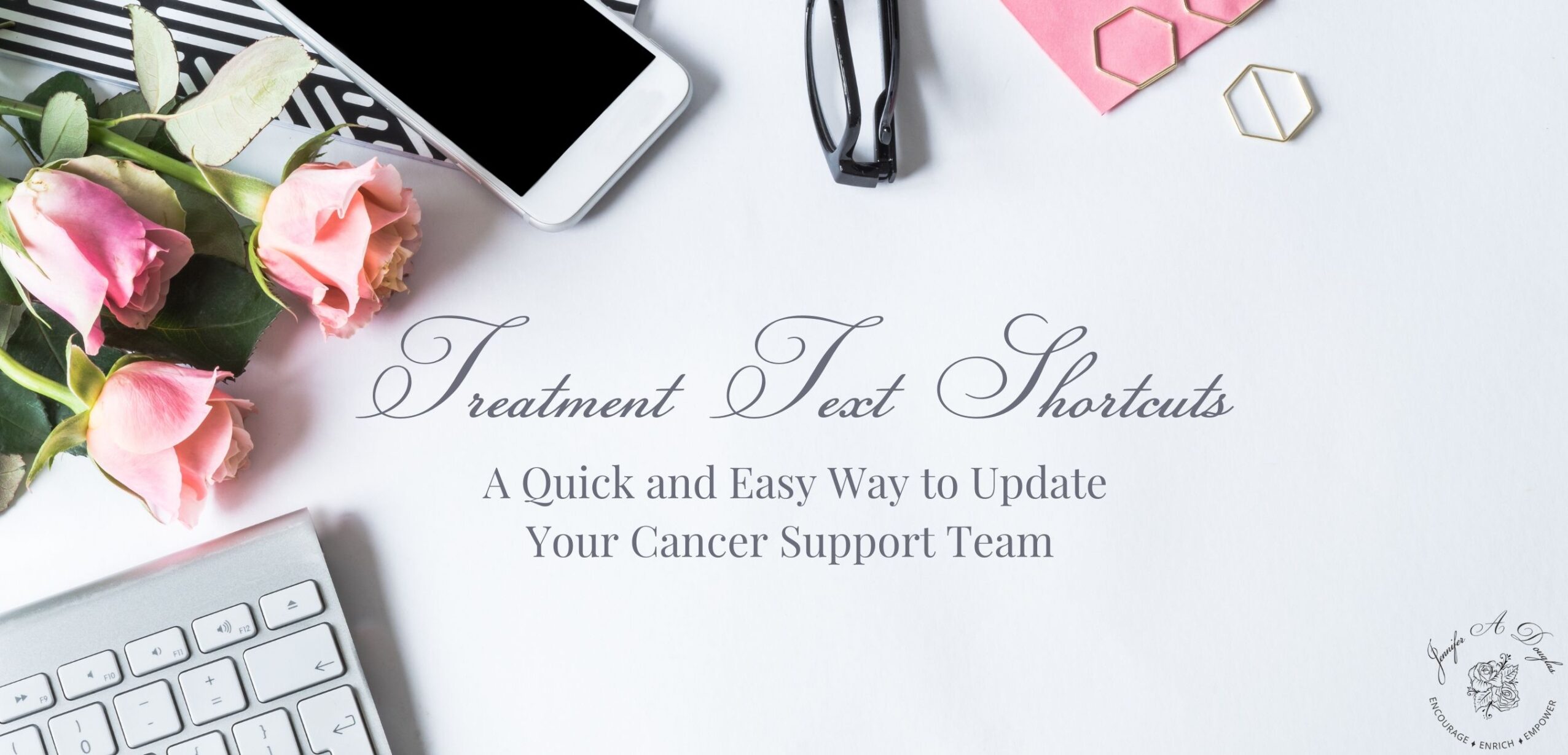
Is Babytam (A Lower Dose of Tamoxifen) an Option After DCIS?
Tamoxifen after DCIS, but with fewer side effects? That sounds like a dream. For DCIS patients, this dream is now a viable treatment option!
In December 2022, The TAM-O1 Study presented its ten-year results comparing 5mg of tamoxifen for three years to a placebo. This lower dose, called babytam, lowered the overall risk of recurrence in the study population by 42%. Study participants reported having few to no side effects.
Oh, how I wish this babytam had been an option for me after my treatment…
Please Note: This information should be considered general information on the topic, not medical advice. Consult your medical team for all medical questions.
What is Babytam?
The typically prescribed and much-studied dosage is 20 mg daily for pre-menopausal patients with hormone-receptor-positive breast cancer. The 20 mg dose, taken for five years, has been the standard recommendation for many years.
Babytam is a 5mg dosage of tamoxifen taken for three years after treatment. Recently, the results from a study out of Italy showed that patients who had non-invasive breast cancer, like DCIS, or other high-risk breast conditions such as ADH (Atypical Ductal Hyperplasia) had a lower risk of recurrence. This benefit has persisted for ten years after beginning the study.
Based on the results of this study, DCIS patients have another option to choose from to reduce the risk of recurrence (and also to reduce the risk of developing a second, unrelated breast cancer.)
Understanding the Study
This Phase 3 study evaluated 5 mg of tamoxifen versus a placebo. Participants took one of these for three years and were followed for seven years after finishing the three-year regime. Researchers then evaluated the data to determine the difference between taking nothing or 5mg of tamoxifen.
One of the important things to note about this study is that it didn’t evaluate how well 5 mg of tamoxifen performed compared to the typical 20 mg dosage. It also only enrolled patients with the following conditions: “atypical ductal hyperplasia (20% of each group), lobular carcinoma in situ (11%, babytam group; 10%, placebo group), or ductal carcinoma in situ (DCIS; 69% and 70%, respectively)—all types of intraepithelial neoplasia.”
Another important consideration when interpreting this study’s results is that it enrolled only 500 patients. To further validate the long-term effectiveness of this lower dose, it would be beneficial to follow a larger patient population at many different cancer institutions.
Patients with invasive ductal carcinoma were not enrolled in this study- so if you have had IDC, your options will be different.

What Were the Results?
The study showed that taking Babytam for three years reduced the risk of getting breast cancer again. Overall results show a 42% reduction in new breast cancer events.
The linked article details the specific results in distinct patient populations- such as menopausal state and surgical choice.
If you’d like to learn more about the results of this study from the study, I highly recommend watching this video with Andrea De Censi, MD. He explains the structure of the study, the results, and the potential impacts for breast cancer treatment and prevention in high-risk populations.
The ten-year results are significant enough for new treatment recommendations for DCIS patients. If 20 mg for five years isn’t tolerable, we can adjust after consulting with our medical team and consider 5 mg for three years.
Research says: Some tamoxifen is better than none!
Why is This Important?
Endocrine medications, such as tamoxifen and aromatase inhibitors, are effective at reducing our risk of getting breast cancer again. For high-risk patients, taking tamoxifen before being diagnosed with breast cancer can reduce the risk of developing it in the first place.
These medications work, but like most treatments, they come with a package of side effects. We all react to these medications differently, and staying on them for the recommended length of time can be difficult.
I know because I stopped at 11 months due to ongoing rib cramps. Read about it here.
I wonder if I would have been able to tolerate the 5mg of tamoxifen better.
In the video featuring Dr. De Censi, he reports that “the other important finding is, of course, safety because the babytam was not associated with an excess in any serious adverse event typically associated with Tamoxifen, including endometrial cancer, venous thromboembolism, and others. And also, the patient-reported outcomes, which are very important for prevention because women do not tolerate having hot flashes or sexual disturbances. With a lower dose, we didn’t see a difference in patient-reported outcomes except for less than an extra hot flash per day in the babytam arm.”
Another study tested the side effects of tamoxifen at different dosages. While this study wasn’t focused on breast cancer survivors, it did break down some of the typical side effects of tamoxifen at different dosages. The biggest difference was noted in vasomotor symptoms (hot flashes). The lower the dosage of tamoxifen, the fewer hot flashes study participants reported. You can access the study here.
If you have been recently diagnosed with DCIS or other high-risk lesion, consider asking your medical team whether babytam is an option for you. I’ve included several links below to recent research so you can educate yourself and bring these studies to your appointment.
If you have been on babytam and would like to share your experiences, feel free to write a comment or email me. I’d love to hear how this option is working (or not working) for you.
Informational Links:
- Study video featuring Dr. De Censi
- “Baby-TAM” Dose May Be Effective, But Not for Everyone”
- “10-Year Babytam Data Show Reduced-Dose Tamoxifen Still Producing Positive Results”
- 5-year results and discussion
- Ten-year results
- “Low-dose tamoxifen still prevents recurrence from non-invasive breast cancer”
- Breast 360
- “Side effects of low-dose tamoxifen: results from a six-armed randomised controlled trial in healthy women”
- History of Tamoxifen “Tamoxifen evolution”
Jennifer Douglas
Jennifer is the author of "A Breast Cancer Journey: Living it One Step at a Time," breast cancer survivor, and patient advocate. Her book, published in 2023 by Bold Story Press, is an encouraging guide for breast cancer patients. It contains first-hand information, organized by topics, to help readers navigate the diagnosis, treatment, and recovery from breast cancer. Her writing emphasizes emotional, mental, and physical well-being along with empowered decision-making.


You May Also Like

Another Biopsy: Not On My List of 2022 Summer Fun!
June 30, 2022
Treatment Text Shortcuts in iOS: A Quick and Easy Way to Update Your Cancer Support Team
October 12, 2021

I have just started Babytam this week, after DCIS (Solid Papillary Carcinoma in Situ). I had a lumpectomy in late December, 26gy/5FR of radiotherapy in late Feb/early March, and now am starting the drug component of treatment. My type, grade, size and stage of cancer all pointed toward a much better than average prognosis to begin with, thus my willingness to risk lower dosage. I discussed this route with my MedOnc and brought the research with me to my appointment in paper form. I am post-menopausal at 62. I could have gone on aromatase inhibitors instead, because my Dexa Scan… Read more »
Thank you for sharing your experience, and I hope it is effective for you with minimal side effects!